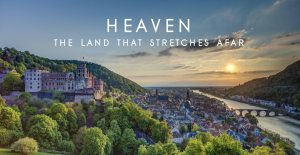 As we reflect back on the Solano sermon series Heaven: The Land That Stretches Afar, many of us have been challenged in our assumptions and received teaching on Heaven, and have given ourselves permission to enjoy imagining that land. Something that these sermons could only briefly touch on was the present heaven or Intermediate State – the place where Christians go when they die. So lets take a moment to think about heaven as it is right now.
As we reflect back on the Solano sermon series Heaven: The Land That Stretches Afar, many of us have been challenged in our assumptions and received teaching on Heaven, and have given ourselves permission to enjoy imagining that land. Something that these sermons could only briefly touch on was the present heaven or Intermediate State – the place where Christians go when they die. So lets take a moment to think about heaven as it is right now.
Perfection is so hard to imagine, because in the present everything is shadowed by brokenness. Apart from the person of Jesus Christ and the outworking of his life on earth, nothing on this planet has been unstained with sin. This is why the present heaven is so hard to grasp. It feels unearthly, lofty, and removed from the life we know. How can we imagine eternal life if it is a kind of life we have never known?
Randy Alcorn’s book Heaven takes the ethereal, nondescript version that most of us think of as “heaven” and brings it down to earth, so to speak. The present, intermediate heaven, the spiritual realm where God’s full presence and faithful people currently dwell, is described as a finite, actual, physical place. This is a place, a land even, where those who know Jesus as their greatest treasure go to be with him and his other followers in a bodily reality when they die. Jesus himself calls this place “Paradise”, which, to Jews steeped in the Pentateuch would have echoed of Eden—a garden, ground to work, trees to eat from, relationships without sin or shame, and God himself walking in the shade. Indeed, since the days of Adam and Eve no human being has experienced life in such a way. However, Jesus reassures us that he means to give us life, and give it abundantly (John 10:10), the fullness of which we only know in part, in starts and glimpses, as in a mirror dimly. “Now I know in part; then I shall know fully, even as I have been fully known.” (1 Cor. 13:12)
Admittedly, Alcorn’s description of the intermediate state comes off feeling somewhat lackluster. The reason for this is that he is intent on emphasizing that it is not the final, ultimate reality for believers. On Earth, we are to wait fervently and expectantly for Jesus’s return and the final consummation of the kingdom of God. If we die before that’s come, we will wait with fullness of joy, expectant and utterly hopeful, free from the finitude and infirmities of fleshly existence, in full communion with the Father and the fellowship of the saints, both with those near and dear and with those from ages past. However, a new reality is breaking in and is not yet complete. The prayers of the saints, the timeless witness of martyred believers, and the sacrifice of every Christian in the proclamation of the good news has drawn us nearer to the Day (Rev. 6:11, Rev. 8:1-4, Matt. 24:14). The New Heavens and the New Earth is a future reality, as sure as Jesus’s punctured side, and a reality towards which we are speeding every day.
The day is nigh, but not yet come! What a grace it is that we get to be home with the Lord if we die before he returns. Paul affirms this, declaring “My desire is to depart and be with Christ, for that is far better.” (Phil. 1:23), and again, “Yes, we are of good courage, and we would rather be away from the body and at home with the Lord.” (2 Cor. 5:8)
But until that day, let us all act and re-enact Hebrews 10:24-25: “And let us consider how to stir up one another to love and good works…encouraging one another, and all the more as you see the Day drawing near.” Once we die, life as we have known it will be over. We cannot die again, we cannot speak the gospel again, and we cannot make intercession for the hurting world around us. We will have passed from it.
What will you do while you still have breath, knowing that death for you, Christian, is only entering into the fullness of life?
“Only one life, ‘twill soon be past.
Only what’s done for Christ will last.”
CT Studd


